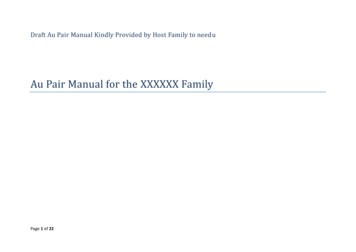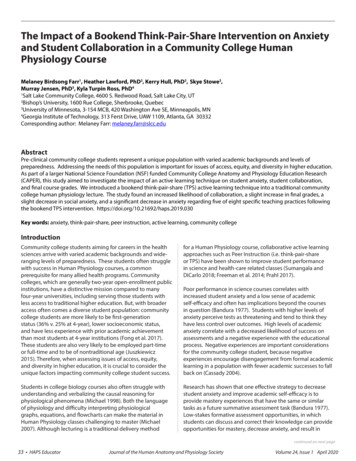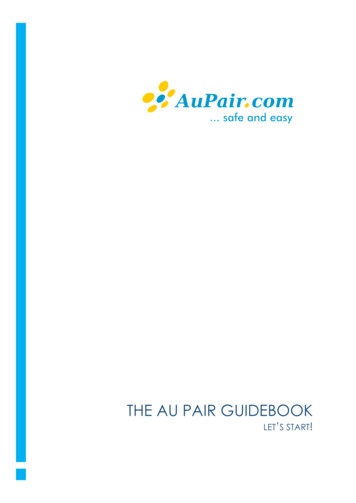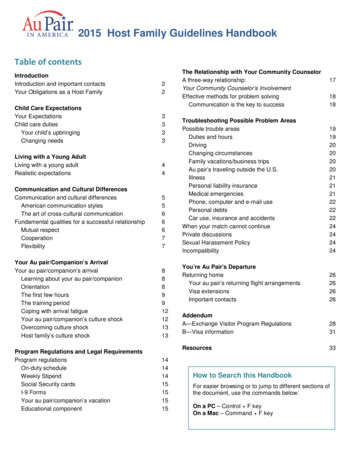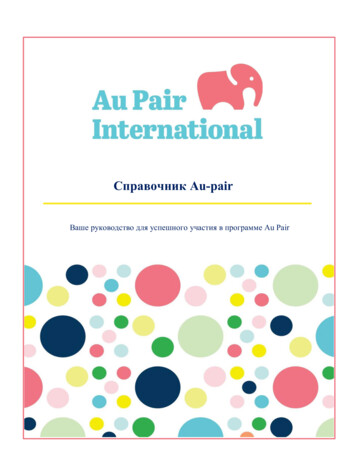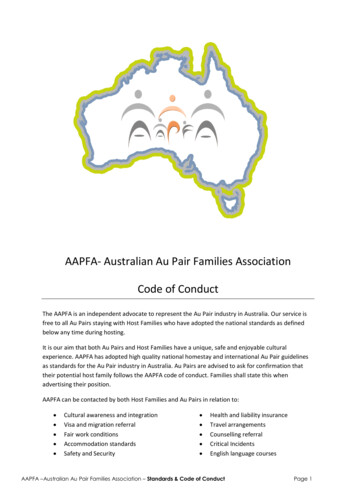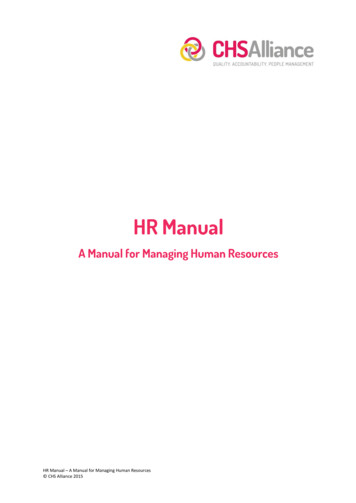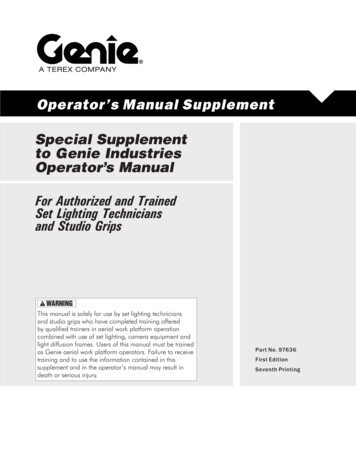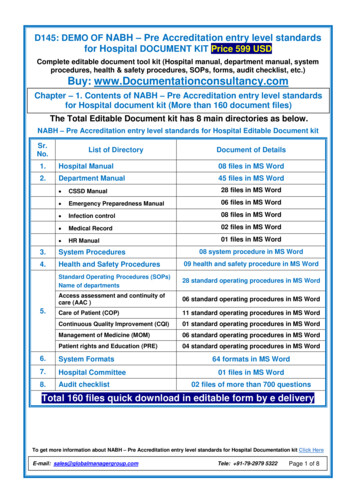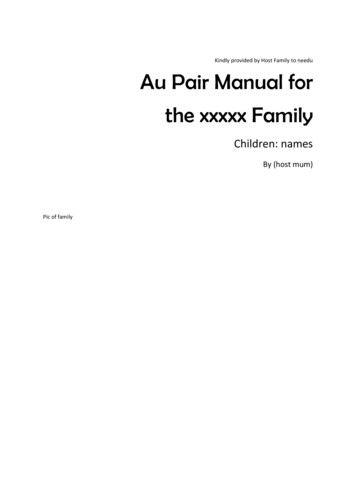
Transcription
Kindly provided by Host Family to needuAu Pair Manual forthe xxxxx FamilyChildren: namesBy (host mum)Pic of family
CONTENTSWELCOME . 3THE AU PAIR/HOST FAMILY RELATIONSHIP . 3BASIC FAMILY INFORMATION . 4DAILY/WEEKLY ROUTINE . 5WEEKENDS . 8SCHOOL HOLIDAYS . 8BABYSITTING . 8HOUSEWORK . 8FOOD . 9MEALS . 10HEATING AND AIR CONDITIONING . 10OTHER POINTS . 10AU PAIR INFORMATION . 12PLACES TO GO WITH THE CHILDREN . 14PLACES TO GO AS A TOURIST . 14ANYTHING ELSE . 15
WELCOMEWelcome to Australia and welcome to our family. We are really excited to have you comeand stay with us and hope you enjoy your time here. We really want you to feel like part ofour family and want you to make this your second home. We are pretty flexible with mostarrangements and have a good support network in Canberra to help us out with our busyhousehold.(Dad) and I both work to run a busy consulting company www.xxx.com and with 4 childrenwe lead a very busy life. We have chosen to host an au pair because an au pair living in ourhome as a family member is someone with whom the children can develop a trusting bond,much like an older brother or sister. A live-in au pair can also be available for evenings,school holidays and can help with the running of the household in many other ways thatimprove the quality and quantity of leisure time for the whole family. Secondly, our familyenjoys the cultural exchange of hosting an au pair. We love sharing our wonderful countryand including our au pair in social activities, outings, day trips and holidays.We have created this Au Pair Manual so that you have a clear understanding of the au pairrole and duties in the household. We have found from experience that open communicationand clear expectations provide a solid foundation for the host family/au pair relationship. Ifyou are unclear about anything in this manual or anything else at all then please do nothesitate to ask.THE AU PAIR/HOST FAMILY RELATIONSHIPWe know au pairs have their own various reasons for coming to Australia and that workingas an au pair may be a means rather than an end. We understand this and we accept it ispart of our duty to help you get the most of your time in Australia. We do this by supportingyou in developing an independent social life, and by including you in day trips and holidayswhenever we have them. We undertake to do all we can to help you enjoy your time inAustralia, however, for the relationship to work successfully au pairs must keep in mind thefollowing;---We employ you to care for our children and to help keep order in the house. Inreturn we provide a safe place to live, your own room, food and a steady income.We have you here for one reason to make our lives easier. If you‘re not doing thatthen there is simply no reason for us to have you.Whilst au pairs typically young, they are expected to be fully functioning adults withbasic life skills. An au pair should be an actively contributing member of thehousehold, not another child to be cared for.Your on-duty hours should be treated as with any other type of employment. Thismeans presenting yourself on-time and ready, and carrying out all duties as andwhen directed without supervision. It also means no excessive use of mobile phoneor other electronic media.
----Your off duty hours are your own time, but remember even then you are not a guestbut a member of the household. You should always be prepared to assist with theroutine e.g. setting table for meals, after dinner clean-up, etc. A good au pair shouldbe looking for ways to help and not waiting to be asked. Your attitude in this regardmore than anything will determine whether you fit in like a family member asopposed to an employee. We want au pairs to feel like part of the family, but it canonly develop with mutual trust and respect.Our children love having an au pair and will tend to treat you as an older friend orsibling. Whilst they understand that the au pair is here to look after them for adefined period, their friendship is genuine and does not turn on and off according toyour hours on duty. You should be responsive and kind to the children at all times.We know that being an au pair can be a great way to have a cheap holiday and weare happy to be part of that, but remember that our purpose in hosting you is forchildcare and housekeeping. If you do not genuinely love children or you thinkhousework is beneath you then you should look for another type of employment.When you arrive in Australia as our au pair we will have interviewed each otherthrough emails and on Skype. You will have already read this manual and you willhave accepted the job as described and be under no illusions as to your hours,duties, pay or any aspect of our home or lifestyle. We will not hesitate to dismiss anau pair who we find is dishonest, untrustworthy or who is unable or unwilling toproperly discharge their duties. Whilst you are not a prisoner and of course mayleave at any time, we expect you to honour your commitment to the role youaccepted.BASIC FAMILY INFORMATIONADDRESSxxxxxxxxxxxxxxxBIRTHDAYSNames and datesPHONE NUMBERSHOME PHONE NUMBER:(02) phoneMOBILE PHONE NUMBERS:(Mum): xxxx xxx xxx (Dad): xxxx xxx xxxAu Pair: xxxx xxx xxx
HOST PARENT WORK PHONE NUMBERS:Work numbersIf you need something, it’s fine to call us at work. Try our mobile phones first as they are thebest way to get hold of us quickly.OTHER PHONE NUMBERS:Other names and numbersSCHOOL DETAILSCHILDREN’S SCHOOLTimes of schoolSchool address and phone numberPRESCHOOLTimesAddress and phone numbersDAILY/WEEKLY ROUTINEThe table below outlines the daily routine highlighting what the children are doingthroughout the week and what your responsibilities are. Note that during school holidaysthere is no school for (names) and there are no activities (no swimming lessons, gymnastics,ballet or Joey Scouts) which means that there will be more work for all of us. We will oftengo to the holiday house or we may need to think up some other activities for the kids to do!The school holidays will include more hours (for all of us) looking after the children. Averagehours will be around 35 hours per week including a few hours cleaning. Some weeks maynot include this many hours but rather than clock on and clock off, we want someone whowill be part of our family and just lend a helping hand whenever it is needed.
TuesdayMondayDaily Routine for 20137:00 am8:00 am8:15 am3:30 pm8:15 amThe children normally wake around 6:30 – 7:30 am. (Mum) and (Dad) usually give them breakfast and get them dressed for the day.You will need to be ready to start the day by 8am and help (Mum) finish getting the children ready for school.(Mum) will leave to take (child 1), (child 2) and (child 3) to school. You will have (child 4) for the day (see notes below).(Mum) (or (Dad)) will return home with the children from school and you will usually be finished for the day.(child 1), (child 2) & (child 4) have swimming lessons from 5:345pm for 30 minutes. Usually (Dad) will be home to take them but if not,(Mum) may need to take him while you stay home with (child 4).The children normally wake around 6:30 – 7:30 am. (Mum) and (Dad) usually give them breakfast and get them dressed for the day.You will need to be ready to start the day by 8am and help (Mum) finish getting the children ready for school.(Mum) will leave to take (child 1), (child 2) and (child 3) to school and take (child 4) to Nanna’s house (or Nanna may come here).The day is yours. It may be a good day to do some cleaning and/or washing the childrens clothes and bedding.(Mum) (or (Dad)) will return home with the children from school and you will usually be finished for the day.(child 1) and (child 2) have tennis lessons from 4pm ((child 2) for 1 hour and (child 1) for 2 hours). (Mum) or (Dad) will take the childrento these lessons but if one of us is not available, you may need to look after the other children.The children normally wake around 6:30 – 7:30 am. (Mum) and (Dad) usually give them breakfast and get them dressed for the day.You will need to be ready to start the day by 8am and help (Mum) finish getting the children ready for school.(Mum) will leave to take (child 1), (child 2) and (child 3) to school. (Mum) will also take (child 4) to Nanna’s for the day (or Nanna maycome here).11:15 amThe day is yours. It may be a good day to do some cleaning and/or washing the childrens clothes and bedding.(child 3) finishes preschool at 11:15 am but usually Nanna (Diane) or Poppa (Warren) will pick him up and look after him for the day.3:30 pm(Mum) (or (Dad)) will return home with (child 2) ((child 1) has after school care).4:00 pm(Mum) will take (child 2) to Ballet lessons for 45 mins.Around 5.00 pm7:00 am(Dad) or (Mum) (or Nanna and Poppa) will collect (child 1) from afterschool care and return the children home.The children normally wake around 6:30 – 7:30 am. (Mum) and (Dad) usually give them breakfast and get them dressed for the day.8:00 am8:15 amAround 10:30 amAround 12:00pmYou will need to be ready to start the day by 8am and help (Mum) finish getting the children ready for school.(Mum) will leave to take (child 1) and (child 2) to school. You will have (child 3) and (child 4) for the day (see notes below).Morning tea for (child 4). Refer to section on food for snack suggestions.Lunch for (child 4). Refer to section on food for lunch suggestions.Around 2:30 pm3:30 pmAfternoon tea for (child 4). Refer to section on food for snack suggestions.(Mum) (or (Dad)) will return home with (child 2) ((child 1) has after school care) and may drop her off and return to work beforecollecting (child 1).Around 5.00 pm(Dad) (or (Mum)) will collect (child 1) from afterschool care and return home and you will usually be finished for the day.5:30pm7:00 am8:00 am8:15 am3:30 pmThursdayWednesday4:00pm7:00 am8:00 am
FridayDaily Routine for 20137:00 amThe children normally wake around 6:30 – 7:30 am. (Mum) and (Dad) usually give them breakfast and get them dressed for the day.8:00 am8:15 am10:00 amAround 12:00pmAround 2:30 pmYou will need to be ready to start the day by 8am and help (Mum) finish getting the children ready for school.(Mum) will leave to take (child 1) and (child 2) to school. You will have (child 3) and (child 4) for the day (see notes below).(child 3) has gymnastics at Erindale from 10:00 – 11:00. Please pack some snacks for (child 4). Refer to section on food for snacksuggestions.Lunch for (child 4). Refer to section on food for lunch suggestions.Afternoon tea for (child 4). Refer to section on food for snack suggestions.3:30 pm(Mum) (or (Dad)) will return home with (child 1) and (child 2) and you will usually be finished for the day.WeekendsYou are welcome to join in family activities that we might be doing but you also have no obligations over the weekend.(Mum) will do some housework like her (and (Dad) s) washing and any additional childrens washing.Notes for (child 4):Routine: As (child 4) is still quiet young his routine is often changing. At the moment, he is usually waking in the morning (between 6 – 8 am) and has a180ml bottle of formula (warm in microwave for 20 seconds and 3 level scoops of formula). He will have breakfast (just over 1 weetbix with warm milk)about 30 – 60 mins after his bottle. He may go to sleep with or without another bottle (usually around mid-morning). He will sleep anywhere from 15minutes to 1.5 hours. When he wakes he may have his second bottle (if he didn’t have it before his nap). Otherwise, he has lunch around 12pm. This canbe veggies (4 cubes of frozen veggies – just warm in the microwave), a packet or jar of baby food or a sandwich etc. He may or may not have a third bottlebefore his afternoon sleep which is just whenever he gets cranky (again, anywhere from 15 minutes to 1.5 hours). When he wakes he may have his thirdbottle (if he didn’t have it before his nap). (Mum) and/or (Dad) will usually be home after school so can take over looking after (child 4) then.Sleep: (child 4) is usually a very easy baby. He has obvious tired signs (rubbing his eyes and getting cranky). Just change his nappy (if needed) and givehim one of his dummies that are in his cot. The baby monitor will be in the living area so you can hear him when he wakes up.Nappies: You will need to change his nappy every few hours (either before or after his sleep) or when he is dirty. Nappies and all the wipes and bags arein his room under the change table. Please place dirty nappies into the nappy bags and place the nappy bags in the green bin out the front near thecarport.Entertainment: We would like you to engage with (child 4). He is at an age where he is eager to play and learn. There are lots of toys to keep himentertained but please play with him and not just leave him to play himself for too long. He cannot be left alone because he will put anything he finds inhis mouth. If you do need to leave him unattended for anything, consider putting him in the cot or highchair so that he is secure. (child 4) (as with all thechildren) will sleep and settle better if they have played outside or been walked outside in the fresh air.
WEEKENDSYour weekends are your own free time for you to do as you please. However you are alwayswelcome to join us for whatever we are doing and we will usually invite you for anythingspecial such as trips to the coast, fishing, etc.On occasion we may request babysitting on an evening or weekend outside of your normalhours of duty. We will give as much notice as possible in these situations.During weekends and other off-duty hours please remember that you are a member of thehousehold and not a guest to be waited on. Meals still need to be prepared, cleaning done,etc. Therefore as for any other member of the household a reasonable level of contributionis expected and appreciated.SCHOOL HOLIDAYSSchool holidays occur 4 times a year, approximately; April – 2 weeks July – 2 weeks October – 2 weeks December/January – 6 weeks(Dad) and (Mum) may or may not have to work during these periods. Regardless it will be abusy time for everyone. The older children may attend a school holiday program for somedays just to give them (and you) a bit of a change.BABYSITTINGThere may be odd occasions where (Dad) and (Mum) might go out for dinner or a movie or awork function. This is unlikely to happen more than once a month. You may also decide tooffer your babysitting services to some of our neighbours and friends. You would normallybe paid about 10 - 15 per hour if you choose to babysit other children.HOUSEWORKNote: We understand that when you first start, it will be a bit overwhelming. It will take youa few weeks to get used to the routine, and the amount of work there is looking after thekids! We don’t expect you to be able to do everything listed here straight away. We will bothhelp you. After a few weeks, and once you are comfortable with everything, then you will beable to cope with the things listed below much more easily.In the morning, the children will usually put their pyjamas in their room but there may besome toys and other items left out that will need to be put away.Kids rooms and toy areas are to be kept tidy. We try to encourage the kids to tidy up afterthemselves, and help when we are cleaning up.At the end of the day we all help with the evening routine. (Dad) or (Mum) will usually cookdinner (or you are welcome to cook dinner as well). The children normally eat a separatemeal first and then they have bath and it is bedtime routine (read books in their beds, turnmusic on). We try to share the jobs, the children may ask you to read them a book or oneperson may put the children to bed while another looks after (child 4) and another personclears the dinner dishes, stacks the dishwasher etc.
We try to keep a shopping list (on the fridge) of things we need at the supermarket. Wetend to go shopping as required every few days. If you are out and pick up some items wewill reimburse you. Please feel free to write on the list foods that you would like.Please keep your room clean, no food scraps or dishes left in there too long etc.WEEKLY CLEANINGOnce a week (if time permits) please:-vacuum the house (except the parents bedroom and ensuite). There is a separatevacuum cleaner head for carpets and another for wooden floors/tiles.-clean the main bathroom/toilet using the cleaning products under the bathoom sink oron the bathroom window seal.-mop the wooden/tiled floors (cleaning product is under the kitchen sink).-wipe/dust surfaces throughout the house (eg. TV cabinets, children's table).-clean the kitchen - wipe all benches, kitchen cupboards and glass spashbacks (using justwarm soapy water) and the stove top (using the green spray or 'Jif'). Cleaning productsare kept under the kitchen sink.-clean the laundry (vacuum/mop floor and wipe the bench and sink).-Washing and ironing. (Mum) will usually do a load of lights and darks on the weekends,feel free to include your clothes if you would like to. Other washing will need to bedone mid-week as part of the weekly cleaning activity. Children’s clothing should befolded (some ironing for tops etc) and put away.-Bedding. Children’s bedding and towels (and your own) should be changed everycouple of weeks. For the children the doona cover can remain on but the top andbottom sheet and pillow cases should be changed. The donna cover should be washedevery month or so.FOODDRINKS: Please make sure the children always have their drink bottle with them. They canalso have milk but the children tend not to drink any soft drinks or cordial and onlyoccasionally have juice.BREAKFAST: (Mum) and (Dad) will usually get breakfast for the children. They may havecereal such as Cocopops o
and including our au pair in social activities, outings, day trips and holidays. We have created this Au Pair Manual so that you have a clear understanding of the au pair role and duties in the household. We have found from experience that open communication and clear expectations provide a s
